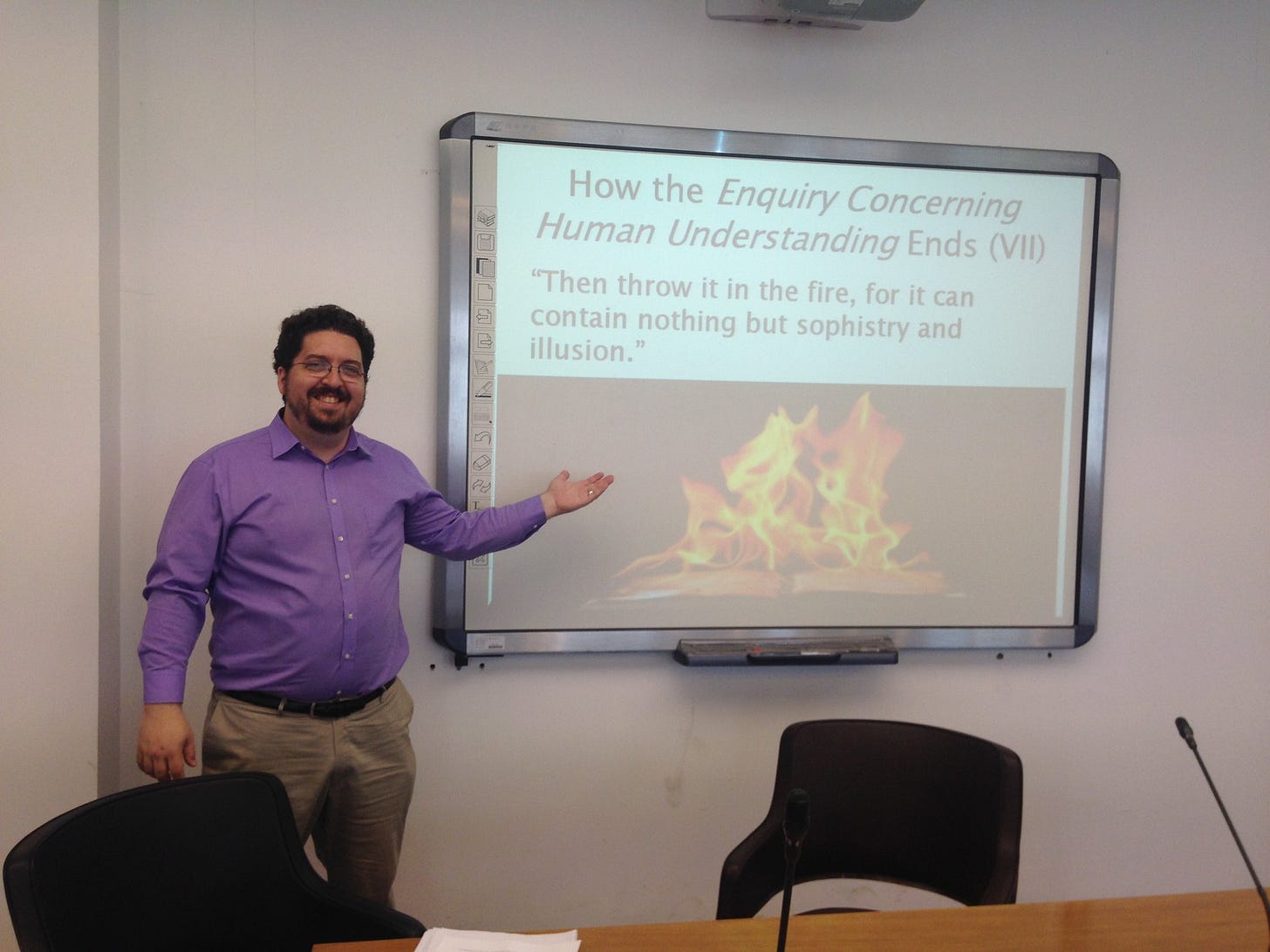Five years ago, I taught a summer class called The Philosophy of David Hume at a university in China. This was in extreme northern China, and unlike most places I’ve been in Asia, I never seemed to run into anyone outside of the university whose English was better than my Chinese. I remember ordering a lot of vaguely bibimbap-like dishes by pointing at pictures on menus and washing them down with watery but strangely wonderful Chinese beer.
It was a great experience and I truly hope that when I admit that this next detail made me laugh, it doesn’t sound like I’m suggesting anything bad about the students. Honestly, the class discussions were fantastic. But I do remember laughing when I looked at one of the final papers and it started with the sentence, “David Hume was a bourgeois philosopher in the eighteenth century.”
Whatever else you want to say about that, you can’t say it’s not true! I mean, Hume was friends with Adam Smith for God’s sake and, for all his (inconsistent) impulses toward conservatism about certain kinds of established institutions, he was very much a supporter of the liberal bourgeois order that was then still very slowly in the process of sloughing off what was left of the ancien regime. If you think every analysis of every historical philosopher should start with an assessment of that philosopher’s relationship to a particular mode of production existing at a particular point in history, then “David Hume was a bourgeois philosopher in the eighteenth century” is an A+ opening.
As it happens, I don’t quite think that. Like the student, I’m a Marxist. Putting aside the inevitable nuances, caveats, and nitpicks, I basically think the class structure of any given society is downstream of the level of development of its productive forces and upstream of its legal and political institutions. I think people at the bottom of society banding together to organize on the basis of shared material interests is the most effective way of bringing about a very different future—what we would typically call “socialism.” I might well disagree with the student about whether that better future would look much of anything like the politically authoritarian and economically inegalitarian realities of contemporary China, but that’s neither here nor there. Here’s the point:
What I’m very much not is the kind of super-duper-Marxist who thinks that every thought expressed by every philosopher is invariably a reflection of class interests or “ideology” and that “critique” revolving around diagnosing the economic origins of those thoughts can substitute for engagement with the ideas themselves and the arguments marshaled in their favor. I’ll defend both materialist analysis and socialist values all day every day, but I’ll defend both in terms of the merits and demerits of arguments advanced for and against those positions. What I am before anything else is a big ol’ philosophy nerd.
The second essay here, coming up next Sunday, is going to be an evaluation of one of of the great Marxist analytic philosopher G.A. Cohen’s objections to John Rawls’s theory of justice. That is, I expect, a little closer to the kind of philosophy content people who know me from my podcasts or my Jacobin column or might expect from me. And that’s not an unreasonable expectation. I do love political philosophy. But I’m also interested in other kinds of philosophy and I want to cast a pretty wide net for my shiny new philosophy Substack so we’re going to start with a little David Hume. Specifically, we’ll be drilling down on some of the core arguments in two of his essays—Suicide and The Immortality of the Soul.
These were both originally slated for inclusion in Hume’s book Four Dissertations (originally Five Dissertations). Hume left them out on the advice of a friend, later saying he’d acted out of “abundant Prudence.” His concern was that the May 1756 General Assembly of the Church of Scotland would condemn him as an “infidel writer.” I’m not sure what the full consequences of that would have ended up being in that time and place, but I can understand why Hume wouldn’t have been eager to find out.
Anyone who’s read his wonderful Dialogues Concerning Natural Religion knows Hume was, if not quite an “atheist” as we’d understand that term in 2023, at least extremely skeptical about what Christians had in mind when they talked about “God.” He was willing to concede that there must be some sort of external force that brought our universe into existence, but he saw no reason to identify this force with the God of the Bible. He argued that polytheism is at least as plausible as monotheism. If it sounds more absurd to us that’s just a matter of cultural conditioning. In one of my favorite riffs in the Dialogues, he says that when we even imagine a rational agent intentionally making a decision to create the universe because that’s what we jump to because we have minds and we design things on purpose, but it would make just as much sense to postulate something like a cosmic spider mindlessly spinning universes. If there were a planet full of sentient spiders—and, I swear he says this, there might well be such a planet out there somewhere—and the spiders were capable of thinking about theology, that’s what they would doubtless come up with.
In the “Suicide” essay, though, and in most of “The Immortality of the Soul,” Hume is willing to grant believers a lot of their core premises for the sake of argument. In the main section of “The Immortality of the Soul,” Hume assumes a morally benevolent creator deciding who goes to Heaven and who goes to Hell. In “Suicide,” he takes it for granted not only that God exists but that suicide would be wrong if it could be shown to violate God’s will. In both cases, he argues that common beliefs about the afterlife and the sinfulness of suicide don’t make sense even with those premises in place.
“The Immortality of the Soul” should have really been called something like “Hell Doesn’t Make Sense.” Only the first section of the essay is really about whether we have immortal souls.
On that point, though, Hume has his doubts. After all, if we have souls at all, why shouldn’t we suppose that they die with the body? Someone like Descartes would tell you that souls are “non-material” and not subject to decay and decomposition the way material things are—but what does that really mean? If you say souls are made of a special kind of soul-substance, then what are the properties of that substance? How are we supposed to know whether or not things made out of soul-stuff are subject to decay and decomposition? Everything with properties we can actually observe does decay and decompose. Maybe souls eventually break down into their component soul-parts, and these end up forming new souls. You can say souls don’t have soul-parts, they’re simple, but then Hume will press you on how you could possibly know that. At the very least, it’s not clear why the “souls die with the body” hypothesis about this alleged different branch of reality is any worse than Descartes’s “souls are immortal” assumption.
This is all great stuff, even if it’s soured for any normal twenty-first century reader by a pretty remarkable paragraph of casual sexism:
On the theory that the soul is mortal, it is easy to explain why women’s abilities are less than men’s. It is because their domestic life requires no higher capacities of mind or body than they actually have. But this fact becomes absolutely insignificant—it vanishes—on the religious theory, according to which the two sexes have equally large tasks, so that their powers of reason and perseverance ought also to have been equal; and—coming back to my previous theme—the powers of both sexes ought to have been infinitely greater than they actually are.
When I assign this essay in “Intro to Philosophy” classes, I like to call attention to this paragraph because thinking about it should make us all a little humble. If David Hume, one of the smartest people in the history of philosophy, believed that—took it for granted, even, treated it as a data point in need of explanation—what kind of historically conditioned stupid shit are the rest of us unreflectively carrying around in our heads?
In any case, Hume establishes at the outset of the essay that he’s not sold on this whole immortality of the soul thing, and then essentially brackets that question for the rest of the essay so he can explore a slightly different question. Assuming we do have immortal souls, does it make any sense whatsoever to believe that God sends the souls of good people to Heaven and the souls of sinners to Hell?
Hume has several objections. For one thing, people are way too complicated for that. We “float between vice and virtue.” In the funniest line of the essay, he says that if “you went all over the place with the intention of giving a good supper to the righteous, and a thorough beating to the wicked” you would “often be at a loss how to choose,” finding that most us don’t have moral characters that are unambiguously good or unambiguously bad.
The two best responses I ever heard to this point were from a Chinese student in the class I mentioned above and from an American student in the “Hume, Kant and the 18th Century” class I taught once at Rutgers. “In Chinese mythology,” the Chinese student told me, “we solved this problem by postulating an 18-level hell."
To which I say: Fair enough.
The American student was an evangelical Protestant of the kind who went anti-abortion rallies but who was also sincerely horrified at right-wingers trying to keep out Syrian refugees. You may know the type. If I had to guess, his church probably had a coffee shop attached to it with some name like “Holy Grounds.” He was a very good student—my Marxist atheist self actually wrote him a letter of recommendation to go to seminary. (He got in.)
This guy’s objection was that Hume is attacking a strawman. Christians don’t really believe that good people go to Heaven. They believe everyone is a sinner and that God generously offers repentant sinners salvation. Which is an awfully dark thing for this very sunny dude to be pointing out to me, because if you unpack it a little the idea is that every single one of us deserves to be tortured forever and ever for—what—not living up to a standard that God creates us in such a way that we couldn’t live up to? And maybe Hume doesn’t directly address this belief because he thinks its implausibility is just obvious. There’s a reason why, on a popular level, so many Christians have always reverted to the more intuitively acceptable idea that people only go to Hell if they’re unusually bad. But my student was correct that, on a doctrinal level, most branches of Christianity have historically embraced the darker vision.
While I do think it’s a flaw of the essay that Hume doesn’t directly engage with this idea, he does make another argument that applies equally well to the “some people deserve Heaven and others deserve Hell” view and the “everyone deserves Hell” view. Reiterating a point he made several years earlier in the chapter on free will and determinism in his Enquiry Concerning Human Understanding, he argues that there’s a conceptual problem with the idea of a just God who’s also all-powerful judging his creations for their behavior:
Every effect implies a cause, which implies another, and so on backwards until we reach the first cause of all, which is God. Therefore, everything that happens is ordered to happen by him, so that nothing can be the object of his punishment or vengeance.
To see Hume’s point here, imagine that you build two robots. These are very advanced science fiction-y robots with thoughts and emotions, but they’re still robots and you made them. Everything they do, you programmed them to do. You programmed one of the robots to kill the other and so it does. Would it then be just for you to morally condemn and punish it for being a murderer?
“Now hold on,” you might be saying. “Humans aren’t robots! God created us but He made us with the free will to do things He doesn’t want us to do.”
Hold that thought.
If you’re a mental denizen of 2023, you probably believe at last one of two things about suicide. Either you’re a religious believer who thinks that suicide is a sin—we still have plenty of those in 2023—or you’re a secularist who thinks it might be acceptable for people in certain end-of-life situations to hasten the inevitable, but that in just about any other scenario killing yourself is tragic and irrational (if not exactly morally wrong). If you hold the second view, you think it’s good that people who attempt suicide in institutional settings are put on suicide watches and that people out in the world who stand on bridges and threaten to jump are talked down by cops. In this view, preventing suicide is something we do for the sake of the suicidal person.
Realistically, you might hold some messy combination of the two positions. Here in 2023, after all, even many of our religious believers are a lot more broad-minded and empathetic about these things than the kind of believers Hume had to deal with in 1756. And the beliefs about suicide held by many thoroughly secular people retain trace amounts of a Christian worldview—most obviously the idea that suicide is “the coward’s way out” of our duty to bear whatever tribulations are put in front of us.
Hume, being (a) deeply skeptical of Christian morality but (b) a mental denizen of an era before the invention of psychiatry, doesn’t believe either of these things. He thinks pretty much what a lot of ancient thinkers did, which is that exiting on your own timeline isn’t an innately unreasonable thing to want to do. If you’re a Roman Senator and another Roman Senator tells you that some humiliation he’s experienced at the hands of the Emperor is too much for him to bear and he’s going to go home and order a slave to draw a bath so he can open up his veins, you don’t fret that Jupiter or Mars is going be offended by that guy’s decision. You also don’t urge him to try therapy and antidepressants. If this is a Hollywood movie where all the Roman Senators have British accents you maybe say “I’ll miss you old friend” and you hug and that’s that.
Me, man? I’m a 2023 secularist. I tend to think suicidally depressed people, like people with heroin problems, benefit from being saved from themselves and will thank you later. So there’s plenty I disagree with in the essay. But Hume’s case against the “sin against God” position is, I think, unanswerable.
Not everyone agrees. If you have access to Jstor—why hello there, fellow PMCs!—here’s an academic paper written by someone who doesn’t think much of Hume’s essay. Here’s another one. And here’s a third. Even without Jstor, you can download a paper I wrote a long time ago where I respond to those guys in great detail here, but for now let me just say this part:
One of the reasons we disagree about the merits of Hume’s argument here is that, while all the components are brilliant, Hume doesn’t always do a great job of labeling the parts and giving you a roadmap of how they fit together. So for example he says at one point that the “life of a man” has no greater importance “to the universe” than “the life of an oyster,” and the guys I hyperlinked basically all say, “What the hell, man? I thought you were granting the opposition their basic premises for the sake of argument. Obviously no religious believer thinks people are as unimportant as oysters!”
And there’s another line where he says that if it’s not objectionably “unnatural” to divert a mighty river from its course to irrigate a city, it can’t be objectionably “unnatural” to slit your wrists and thus divert “a few ounces of blood from its natural channels.” And since they read this as an argument that because suicide isn’t objectionably unnatural it can’t be morally wrong, unsympathetic critics might be forgiven for wondering why Hume hasn’t just committed himself to murder also being totally fine. Why can’t I divert a few ounces of my enemy’s blood?
Here's how I think the pieces of the essay fit together:
Hume thinks that if suicide is wrong, there must be a victim. Either it’s a transgression against God, a transgression against yourself, or a transgression against other people. He doesn’t think it’s any of the above, so he doesn’t think it’s wrong. I’ll focus in what follows on Option #1, both because that’s where Hume spends most of his time and because that’s where he makes his best arguments.
You could do pure Divine Command Ethics, saying that whatever God arbitrarily decides to condemn is wrong for no other reason than that He condemns it, but that’s not a great option. It runs into the Euthyphro problem, which you can watch me talk about here, in the opening statement of my debate with right-wing megachurch pastor Douglas Wilson. It also came up in my debate with Charlie Kirk, where he answered in an…interesting way that had the happy side effect of inspiring Hannah Hoffman to record this song. I’ll leave you to check all that out at your leisure but for the moment let’s just take it as read that DCE is not a good option. In any case, other than footnote asserting that Old Testament law doesn’t condemn suicide (and that Old Testament law shouldn’t matter to Christians even if it did), Hume doesn’t spend any time on the divine-command angle.
Instead, he’s interested in the question of whether suicide is objectionable on the grounds that it violates God’s plan. This in turn divides into two possibilities. The first is the idea that exiting the stage before the director has decided it’s time messes up God’s plans for the world in general. That’s the part I take Hume to be addressing with all that stuff about humans vs. oysters and rivers vs. veins.
It's wrong to divert a few ounces of your enemy’s blood because that’s a transgression against the enemy himself. Since concepts like “clinical depression” and “mental illness” are foreign to Hume’s conceptual map of the world, he thinks that if you’ve made the judgment that your life is no longer worth living, the idea that you’re transgressing against yourself makes no sense. So the only remaining option is that you’re transgressing against God. But how? By messing up God’s great plan for the world in general?
We don’t worry that we’re that plan by diverting the course of a mighty river. So it’s a bit much, he reasons, to think we’re messing it up by diverting a few ounces of blood.
Could diverting a few ounces of blood mess up the great plan? Sure. If Hitler had eaten a tainted oyster in 1939 before he had a chance to invade Poland and that had taken the Führer off the board, that would have been huge, but the big picture consequence of the presence or absence of the average oyster from the perspective of the Dr. Strangelove “big board” in the sky is pretty minimal—and the same is true of the presence or absence of the average human being standing on a bridge threatening to end it all.
OK, you say, but forget the big board—what about God’s plan for your individual life and how it touches other individual lives? There’s a nice, heart-warming It’s a Wonderful Life sort of version of this objection and a nastier version that echoes even in the mouths of people who may not be personally religious but still talk about “the coward’s way out.” The most obvious way of unpacking this phrase is that God has placed you in a given set of life circumstances and you owe it to Him to stick it out. Here’s how Hume summarizes the original raw version of this idea:
You may say:
When a soldier has been stationed as a sentinel in a particular place, if he deserts his post without being ordered to do so he is guilty of a crime. Well, God has stationed you in a particular place, like a sentinel, and if you desert your post without being recalled, you are also guilty of rebellion against God, and have made him displeased with you.
And Hume’s response to this argument finally takes us back to the point on free will we left off on in our discussion of “The Immortality of the Soul.” Here’s what he says:
What makes you think that God has placed me in this station? It seems to me that I owe my birth to a long chain of causes, many of which involved voluntary human actions. ‘But God guided all these causes’, I hear you say, ‘including those voluntary actions: nothing happens in the universe without his consent and co-operation.’ But in that case my death, even if I bring it about voluntarily, happens only with God’s consent; and whenever I find pain or sorrow so hard to bear that I am tired of life, I can conclude that I am being clearly and explicitly recalled from my post.
While Hume is a compatibilist about free will and determinism—and if you don’t know what compatibilism is, I promise you we’ll be getting into it in future installments here!—he’s a thoroughgoing determinist. He thinks events at Time T2 can always be traced back to causal triggers at Time T1 and if our knowledge of science is incomplete and we don’t always know what about T1 generated the events at T2, that’s no reason to think there aren’t chains of cause and effect to be discovered. In his Enquiry Concerning Human Understanding he describes gaps in our knowledge of these chains of cause and effect with an analogy about peasants and a village clock that stops working. The peasants might not be able to say much beyond “yeah, sometimes those stop working,” but that doesn’t mean there isn’t an answer waiting to be found. An experienced clockmaker could take one look at the gears and see the problem.
But his point here is even stronger if you read it as a dilemma for the Christian who thinks suicide is abandoning your God-given sentry duty. Either voluntary human actions can mess up God’s plan for your life or not. Either way, he goes on to argue, suicide can’t mess up that plan.
“I owe my birth to a long chain of causes, many of which involved voluntary human actions.” Maybe God’s plan for my great-grandmother was for her to become a nun, or if not that then to marry someone other than my great-grandfather, and her voluntary human actions messed up the Plan. Or it could be that God wanted her to be with my great-grandfather but He wanted them to conceive a few minutes earlier or later or in a slightly different position so a different sperm-egg combination would have produced a different human being than my grandfather. On any of these scenarios, there’s no reason to think God wanted you to exist at all.
On the other hand, if you assume every single one of great-grandma’s choices, and every single one of the other choices everyone else would have to make for this to all be arranged just so—the guy in line in front of great-grandma and great-grandma at the bakery the day they met taking as long as he did with his order and giving them a chance to talk, etc.—were arranged according to God’s specifications, that sure doesn’t sound like humans have the power to mess up God’s plan. It sounds like nothing happens He didn’t plan to happen. But if so, suicide can’t be a transgression against God.
And this brings us to the point that I think the critics cited above manage to most spectacularly miss—the one that ties together “Suicide” and “The Immortality of the Soul.” If Hume is right that it makes no sense to think suicide is wrong because it violates God’s will, then we should similarly doubt that anything anyone ever does is wrong because it violates God’s will.
That’s not an objection to Hume’s moral philosophy. It’s its starting point. Morality is about human-level considerations like avoiding suffering and respecting each other’s rights, not what we owe to some emperor in the sky. Once we realize that divine commands and divine judgment aren’t the right basis for the way we as shaved monkeys with the capacity for greatness relate to each other and morally evaluate each other’s behavior, once we decide in fact that all this God stuff is at best one giant distraction, we’ve entered into a whole new universe of secular thought.
Or to put that last point a little differently:
David Hume was a bourgeois philosopher in the eighteenth century.













I am so glad you shared this essay this week. I haven't had the time or motivation to read posts prior to when I joined. This presents some ideas that have rattled around my head many times in a new light
Ben, I am not sure where you come down on the big issue that frames this post, namely whether it makes sense to think about Hume’s arguments outside of the historical context in which he was writing. Take the argument against divine command theory. It is unanswerable once you accept the legitimacy of Socrates’ question. But that question wouldn’t necessarily be one that people could even think at all times. And that isn’t a knock against the rationality of those people since there are plenty of questions that make no sense to us (why should I care about human dignity?)